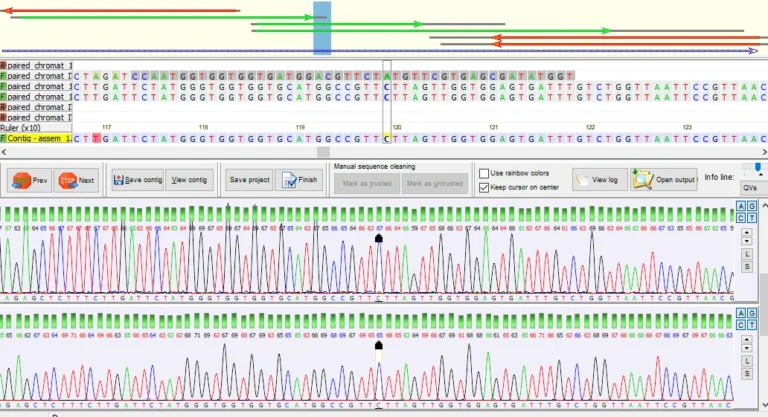Software products
We create software for scientists, by scientists
DNA Baser Sequence Assembler
It takes you from raw reads (chromatograms) to quality controlled contigs in a single step.

Read end trimming
DNA Baser removes low-quality ends either during contig assembly or while processing individual Sanger chromatograms.
Ambiguity correction
Ambiguous bases in the contig are automatically resolved using the quality values of individual base peaks.
Vector removal
Contaminating vector sequences are removed from contigs or chromatograms using user-defined recognition sequences.
Mutation detection
Mutations between chromatograms are identified using our proprietary base-calling algorithm.
Batch contig assembly
Automatically assemble contigs from thousands of samples using predefined read-name patterns.
Contig viewer and editor
View and edit the reads, consensus contig, and corresponding chromatograms in a synchronized display.
Chromatogram viewer and editor
View individual Sanger sequence chromatograms, trim their ends, and edit bases with ease.
Integrated base caller
Enhance base detection accuracy from sequence chromatograms with our proprietary base-calling algorithm.

Delphi in all its glory (part 1)
Begin your programming journey in Delphi.

Delphi in all its glory (part 2)
Aquire advanced Delphi programming skills.

Delphi in all its glory (part 3)
Learn about libraries.
Delphi programming language
The first book in the trilogy explores the Delphi language.
Whether you’re a curious novice venturing into the world of coding for the first time or already the user of a different programming language, this book is your gateway to Delphi coding.
Even if you know some Delphi you could still learn a few tricks (especially things related to code safety) from this book. The book is also perfect for old-school programmers that were always afraid to switch to objects.
The second book addresses the more seasoned developers aiming to enhance their craft. It focuses on the more advanced topics, such as 64-bit code upgrade, compiler and debugger inner working, speed improvements, memory management, proper exception handling, architecture design and code safety in general.
This third book goes deep into the inner workings of Delphi’s library system. How libraries are useful to organize your code, how to set up your own library system, and how libraries can dramatically increase your compilation speed. Building custom visual components will not be in focus, even though we will have a chapter and some code about that. I intend to expand the book to cover more of that.
There will also be a chapter about how I turned a personal library called Proteus into a successful commercial product. By purchasing that book, you will get access to the code of that library.
Book layout
First, we will see what kind of applications we can do with Delphi – spoiler alert: you can do anything you want.
Then we will install Delphi and study the anatomy of a Delphi project in order to create our first application.
After that, we take a quick look at the IDE, and then, we finally dive into the Delphi language. After we learn the basics, we will see what is safe to do in Delphi and what is not, and most important, why. After that, we move to object-oriented programming, and then we will learn about visual components.
A second purpose of this book is also to demonstrate that Delphi is the best tool if you want to develop:
- Good-looking GUI applications
- Cross-platform applications
- Fast applications
- Business and scientific applications
Always focused on code safety
This trilogy is not the regular kind of book where I show you the basics of programming and keep circling around simple code examples. The main purpose of the books is to take you to the “meta” level and beyond that.
We will learn how to achieve code modularization through libraries, how to avoid circular references, how to build stable programs through reliable code, how to avoid typical programming pitfalls, how to turn mondain Delphi features into an error-prevention system, and why some programming concepts are safer than others.
In parallel with all the above, we will compare Delphi with other languages (mostly C++, C#, R, Java, and Python) to see their merits and pitfalls.
How is this book written?
The pace of this book is allegro; the tone is non-conformist, light and funny, with jokes here and there and quite some colorful language.
Most important, in my books, I will never ask you to just believe me. I hate the “because I said so” mentality. Instead, I will back up my statements with hard evidence: links to white papers, scientific articles, proved concepts, code examples, benchmark tests.
Founding members

Dr. Cristina Moraru
A researcher by hearth, with a passion for viruses of microbes, method development and bioinformatics.

Gabriel Moraru
An experienced software engineer, with a passion for the Delphi programming language.